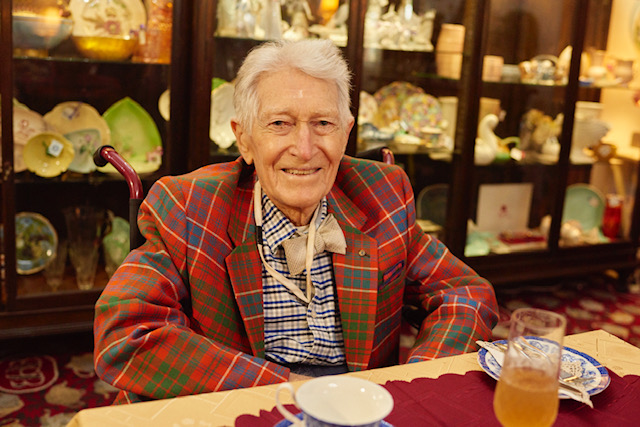The Hon Dr Frank Roland McGrath AM OBE

On 30 December 2021, the Hon Dr Frank Roland McGrath, a member of the NSW Bar Association since 1951, and former member of Fourth Floor, Wentworth Chambers, notches up a ‘ton’, with his 100th birthday. Her Majesty, Queen Elizabeth II, and the Governor-General, His Excellency General the Hon David Hurley AC DSC (Retd) and Mrs Linda Hurley, have already sent cards in congratulations to Frank for his approaching centenary.
Born in Birkenhead, England, Frank was the only child of James McGrath, a shipwright, and Mary Broadfield, a tailoress and fine soprano. The family came to Australia in 1924. After attending Canterbury Boys’ High School, Frank completed his BA (Hons) in History, with the University Medal in 1942, then his MA and his LLB at the University of Sydney. At university he met Amy Cumpston and they married in 1944, a marriage which lasted until Amy’s passing in September 2019, a few weeks shy of their 75th wedding anniversary. Running beside Frank’s career was Amy’s – as a poet, playwright, and novelist.
A particular cameo of Frank’s career was his legendary role in the Ironworkers dispute of the late 1940s – an episode recounted by Amy in her book, The Forging of Votes (1994). While an undergraduate, through his father James, Frank obtained work as a blacksmith’s striker on the Balmain waterfront, and became a member, and sometime secretary, of the Balmain branch of the Federated Ironworkers’ Association (FIA).
The saga that emerged involved a challenge to the election in the FIA, which, as would be proved, involved the printing of extra ballot papers, and the marking of them in bulk to manipulate the outcome in favour of communist candidates. In November 1951, the forgeries were exposed and set aside through a legal challenge in the Court of Conciliation and Arbitration.
By the time of the case, Frank had completed his articles with Cecil O’Dea at Carroll and O’Dea, solicitors supporting the challenge. Proving forgery is hugely difficult, but there was a moment when Frank saw something that turned the tide:
I was standing looking at one of the papers for the umpteenth time when I just happened to flip it so that it caught the light. I suddenly saw what appeared to be impressions of crosses on the paper – and it hit me like a bolt out of the blue. It was the conclusive evidence we had been looking for.
The proof of forgery lay in the indentations and impressions in the texture of hundreds of ballot papers, the only possible explanation for which was that these papers had been marked in stacks. Interestingly, Frank, now an instructing solicitor, was also called as a witness: as to what he could see on the papers.
Frank was admitted to the Bar in 1951 and, in 1966, appointed as Commissioner, then Chairman, of the NSW Workers Compensation Commission. In 1984, he was made the Chief Judge of the NSW Compensation Court, in which capacity he served until his compulsory retirement, at the age of 72, in 1993. In his retirement speech to the court, he said that his life on the bench had been ‘a life of fulfilment and enjoyment’. The Hon Michael Kirby AC CMG described Frank as ‘a just and accurate Judge’ and one of his own mentors. Frank’s official portrait, as Chief Judge, painted by Bill Leak, hangs outside the ceremonial court in the Downing Centre.
Prompted by Amy to undertake a ‘project’ in retirement, Frank completed his PhD at the University of Sydney, at age 79. It was published as a book, The Framers of the Australian Constitution, 1891–1897: Their Intentions, which Professor David Flint described in his foreword as ‘a significant contribution to our understanding of the interpretation of the Australian Constitution’.
A gifted pianist, Frank also took up playing the organ in his retirement, and sought out tuition in Sydney and London, with a number of church organists. He also dabbled in writing, including a play, ‘Harry was a Bolshie’, that was performed in the Mews Playhouse, a theatre established by Amy in the backyard of the family home in Centennial Park in a former stables/dye factory. Frank also wrote the theme music for the play, along with two unpublished novels – The Great Fenian Hunt, about the attempted assassination of Prince Alfred, the Duke of Edinburgh in Sydney in 1868, and The Dark Ravine, set in New Guinea.
In 1977, Frank received the award of OBE, and in 1991, he was made a Member of the Order of Australia (AM) ‘for service to the law, particularly in the field of workers’ compensation and to the community’. His community work acknowledged, among other things, extensive service to the arts, such as his presidency of the Arts Council of NSW 1975–84. He was also a keen centreboard sailor, based at the Double Bay Sailing Club, serving as commodore of the club for a number of years. Frank was also the chairman of the Australia Day Anniversary Regatta for 15 years – the oldest continuously conducted annual sailing regatta in the world, commencing in 1837.
Frank continues his active interest in the law, particularly with issues of constitutional interpretation that arise in the High Court. He engages in regular lively conversations with the eldest of his four daughters, Emeritus Professor Rosalind Croucher AM, also a member of the Bar Association and currently President of the Australian Human Rights Commission.
Photo: Bec Lorrimer, bec@beclorrimer.com